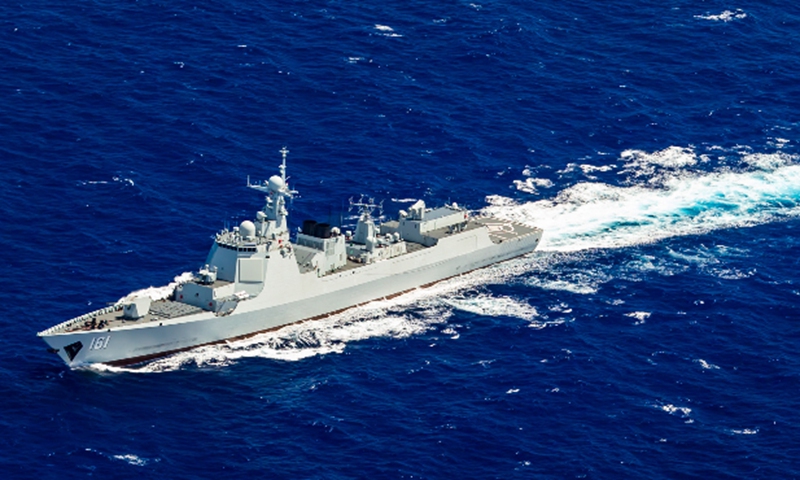UPDATE: Chinese diplomat’s election to sea tribunal with high count of votes reflects intl recognition: FM
By Xu Keyue and Cui Fandi Source: Global Times Published: 2020/8/25 15:34:43

The guided-missile destroyer Hohhot (Hull 161) attached to a destroyer flotilla with the navy under the PLA Southern Theater Command steams in waters of the South China Sea during a realistic maritime training exercise in early August, 2020. (eng.chinamil.com.cn/Photo by Li Wei)
Chinese Ambassador to Hungary Duan Jielong was on Monday elected as a member of the International Tribunal for the Law of the Sea with a high count of votes, which reflected the international community's recognition of China's claims and actions on maritime issues and was a "slap in the face" of the US, as the country had not accepted the law but instead pointed its finger at and smeared China's moves.
Duan is one of the six to have been elected in the first round of voting by the States Parties to the UN Convention on the Law of the Sea (UNCLOS) to become a judge settling maritime disputes, the Xinhua News Agency reported Monday.
Other members are David J. Attard of Malta, Ida Caracciolo of Italy, Maria Teresa Infante Caffi of Chile, Maurice Kengne Kamga of Cameroon and Markiyan Kulyk of Ukraine.
One of the tribunal seats has yet to be filled and a second round of restrictive voting will be held on Tuesday, reports said. The contenders will be Kathy-Ann Brown of Jamaica and Rodrigo Fernandes More of Brazil.
The tribunal is an intergovernmental body set up by UNCLOS and has 21 judges who hold nine-year terms. A third of the members are replaced every three years.
The election of Duan once again shows China's voice is reaching further into the international community, Li Haidong, a professor at the Institute of International Relations of the China Foreign Affairs University, told the Global Times on Tuesday.
"China's voice is gaining more recognition and support, which proves that the international community is recognizing China's important role given its past efforts," Li noted. "As the world's major powers have vast differences regarding perception of maritime rights, China's gradual prominence will help bring consensus in future disputes."
The US, which has no right to vote on the matter, has been seeking to stop China after Duan was nominated as a candidate, arguing that "Beijing has flouted international sea laws in the disputed South China Sea," US media outlet CNBC reported on August 3.
Li warned the US not to overestimate its ability to do evil in the international community. "This is no longer the era of Western-led colonialism, as countries are awakening their international consciousness," he said.
Shen Yi, a professor of international politics at Fudan University in Shanghai, told the Global Times that US' failure to intervene shows that the international influence of US hegemony is steadily declining, which is a foreseeable trend for the future. In contrast, China's international influence is growing "as a result of past contributions."
US Secretary of State Mike Pompeo recently attempted to smear China by accusing it of seeing the South China Sea as its "maritime empire." In a tweet in late April, Pompeo said, "The South China Sea is not China's maritime empire" and urged "free nations" to unite to prevent China from taking "more territory."
The US, which is thousands of miles from the South China Sea, has sought to dictate regional affairs, repeatedly sending aircraft carriers and warplanes to the waters to assert its hegemony. The US has also constantly tried to stir up the situation regarding South China Sea disputes.
By contrast, China has been committed to promoting the peaceful settlement of disputes with other South China Sea claimants in the region, said analysts. Thanks to the joint efforts of the relevant parties, negotiations on the Code of Conduct on the South China Sea are progressing steadily, the analysts noted.
Li warned the US to reflect on its responsibilities as a great power, considering its actions over the past few decades.
Since the establishment of the tribunal in 1996, three Chinese have served as judges: Zhao Lihai (1996-2000), Xu Guangjian (2001-07) and Gao Zhiguo (2008-20).